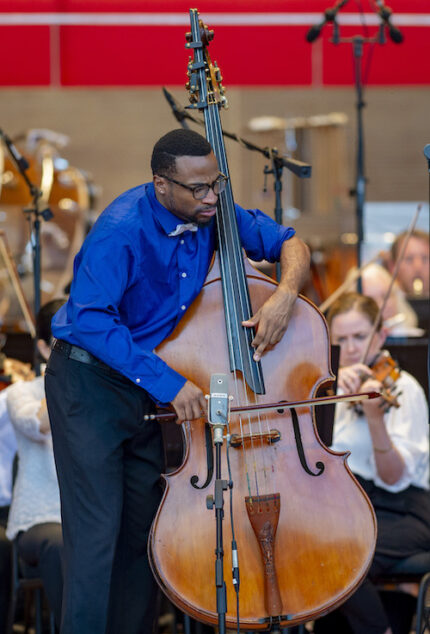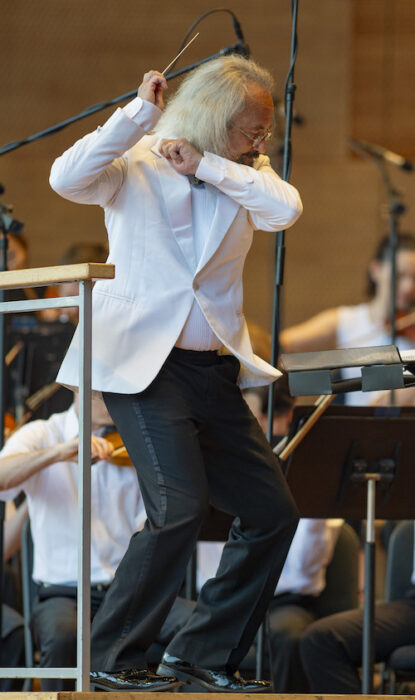Foley’s standout debut highlights mixed Grant Park Orchestra program

Wednesday’s concert of the Grant Park Orchestra was billed as “Brahms Academic Festival Overture”—no doubt as that brief curtain-raiser was the only work on the program at all likely to strike a familiar chord.
For the balance of the program, artistic director Carlos Kalmar mined more unfamiliar fare in the downtown festival’s trademark manner. While the results Wednesday were mixed, Kalmar’s spirit of exploration with the GPO remains a summer treat.
After his tiresome ritual of welcoming the audience by repeating factoids in the program notes, Kalmar launched into the Brahms. There was a hushed urgency to the opening bars, and a gleaming brass chorale segued into the score’s boisterous main paragraph. There were equal parts of vitality and lyrical sweep here, with Kalmar emphasizing the jaunty college drinking songs Brahms incorporated.
Nino Rota is best known for his many film scores, particularly his Oscar-winning effort for The Godfather II, and the Italian composer’s concert music also has an unmistakably cinematic quality. Such was the case in his Divertimento Concertante, a work for solo bass and orchestra from 1973, heard Wednesday with soloist Xavier Foley.
Foley—a laureate of the Sphinx Competition and Young Concert Artists Auditions—proved a standout soloist. He was a poised presence in the bustling opening Allegro, which felt evocative of an urban street scene, always sympathetically engaged in dialogue with the orchestral support. He brought an apt galumphing energy to the ponderous March, and embodied the sinister atmosphere of the Aria (with a whiff of Michael Corleone about it).
Foley brought dynamic panache to Rota’s headlong Finale, with playing that was extroverted but always in command, dispelling any skepticism as to his instrument’s potential as a solo vehicle. Kalmar led a detailed and responsive accompaniment here as throughout.
A rousing ovation brought Foley back out for an encore. A talented composer in his own right, Foley offered his Etude No. 11 “The Singer!” a soulful, rock-inflected miniature that demonstrated both the flexibility of his technique and his fluency across genres.

The program closed with Robert Fuchs’ Symphony No. 2 in E-flat Major, Op. 45. Fuchs is best known as a pedagogue, having mentored the likes of Mahler, Sibelius, and Hugo Wolf in his capacity as a professor at the Vienna Conservatory. While he certainly had an impact on the course of music history through his teaching, his own compositions—though admired by no less than Brahms—are seldom heard today.
Wednesday’s performance left one happy to know Fuchs primarily through his pupils, as this reclamation project from the vault proved one of Kalmar’s less essential discoveries. The broad-shouldered Allegro moderato had an open-air vigor, which combined with its triple meter greatly evoked the opening movement of Brahms’ own Symphony No. 2 (written a decade before). Still, despite Fuchs’ fine craft, the music felt amorphous and lacking in depth.
The Andante danced lightly with off-kilter upbeats, and the flowing Menuetto—with a contrasting faster section in duple meter—again greatly recalled the analogous movement of Brahms’ Second. (Small wonder Brahms admired Fuchs’ work.) Here, the principal winds made refined, characterized contributions, and Kalmar brought out the music’s graceful qualities.
The Allegro giusto finale was a sleepy affair, which despite its fast clip had little build or momentum. A Grant Park concert was probably the best possible setting for Fuchs’ comely but derivative score.
Carlos Kalmar leads the Grant Park Orchestra 6:30 p.m. Friday and 7:30 p.m. Saturday at the Harris Theater, in a program of music inspired by Shakespeare: Weber’s Overture to Oberon, Vaughan Williams’ Serenade to Music, Mendelssohn’s A Midsummer Night’s Dream, Tchaikovsky’s Hamlet Fantasy, and Shostakovich’s Suite from Hamlet. grantparkmusicfestival.com
Posted in Performances


